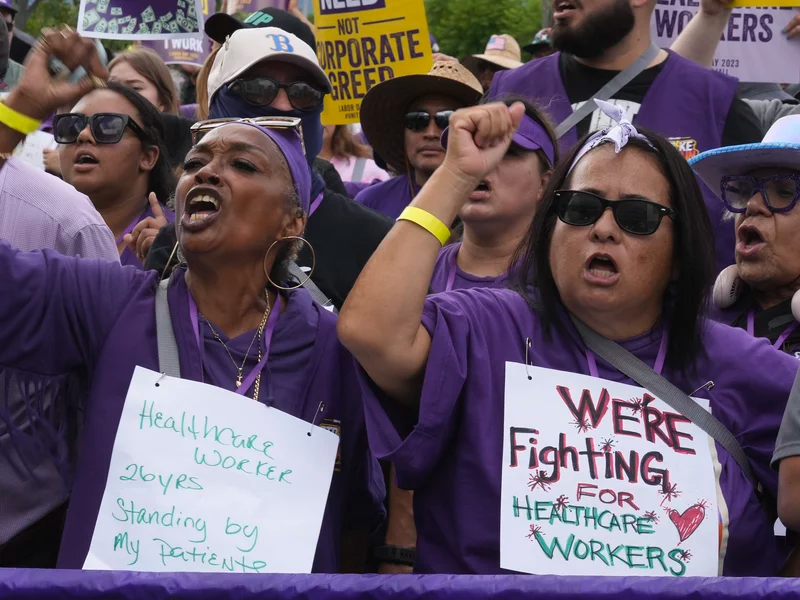
Frontline health care workers hold a demonstration outside Kaiser Permanente Los Angeles Medical Center on September 4.Damian Dovarganes/AP
Health care workers at hundreds of Kaiser Permanente hospitals and medical facilities across the U.S. walked off the job on Wednesday morning, in an effort to ramp up pressure on their employer to fix a staffing shortage that has intensified since the start of the COVID-19 pandemic.
Over 75,000 workers — including nurses, emergency department technicians, pharmacists and hundreds of others — went on strike in California, Colorado, Washington, Oregon, Virginia and Washington, D.C.
It is the biggest health care strike in U.S. history, according to the unions.
Kaiser, headquartered in Oakland, California, is one of the largest nonprofit health care providers in the United States, serving nearly 13 million patients. Most Kaiser workers who have walked off the job will be on strike for three days, until Saturday morning — except those in Virginia and Washington D.C., who will be on strike for 24 hours.
What this means for patients
The health care provider has said its hospitals and emergency departments will remain open throughout the strike, staffed by physicians and other staff. It said it is onboarding professionals who will service in critical care roles during the strike.
Kaiser has warned patients that non-emergency and elective services may be rescheduled. The organization is expanding its network of pharmacy locations to include community pharmacies, to ensure patients can access medication in the event that outpatient pharmacies temporarily close. Inpatient pharmacies at Kaiser hospitals will stay open.
About 60% of Kaiser employees, including doctors, will still be working throughout the strike, according to the organization.
Short-staffing crisis
These health care professionals are the latest group of crucial workers to strike over work conditions and pay this year, after the Hollywood writers and the ongoing United Auto Workers strike, among others.
Their walkout is driven by a short-staffing crisis that workers say has led to tough working conditions that make it increasingly difficult to retain Kaiser employees, while also simultaneously leading to a deterioration in the quality of care for Kaiser's patients.
About 11% of union positions were vacant in April of this year, according to Kaiser data obtained by the unions.
"Health care workers choose this profession because it's a passion for them. It's a calling," said Caroline Lucas, executive director of the Coalition of Kaiser Permanente Unions. "And folks don't feel comfortable staying at jobs where they don't feel like they can give the best patient care possible."
The unions allege Kaiser has engaged in unfair labor practices by refusing to bargain in good faith to solve the staffing crisis. Kaiser denies these allegations. Kaiser has asked workers to reject calls to walk off the job to prevent harm to patients. But employees like Brooke El-Amin, who has worked at Kaiser for 21 years, say patient care is already suffering due to staffing shortages. The goal of the strike is to put pressure on Kaiser to improve patient care in the long-run. "I don't want to strike," El-Amin said. "But I feel like Kaiser is already letting down our patients — they're already letting down the employees." Pharmacists and optomestrists in Washington D.C. and Virginia were the first to launch the strike at 6 a.m. local time Wednesday morning, followed by workers in Colorado and on the West Coast. Dozens of Kaiser employees, energized by their union's momentum, joined the picket line at Kaiser's Springfield Medical Center in Virginia soon after the strike began. Kaiser clinical pharmacist Keyani Adigun joins her union's picket line outside the Kaiser Permanente Springfield Medical Center in Virginia, on Wednesday, Oct. 4 2023.Danielle Kaye/NPR Keyani Adigun, a clinical pharmacist in Washington D.C., said she struggled throughout the pandemic to keep up with patient demands, as colleagues left Kaiser in droves. And she said her employer still isn't providing enough resources — more than three years after COVID-19 hit the U.S. "I hope that Kaiser leadership hears our voices," Adigun said, before joining the picket line. "The harder we work, the less resources we start to see." The collective bargaining agreement for employees represented by a coalition of unions expired on September 30 without a new agreement in place. The unions and Kaiser executives are still far apart on key sticking points, including wages, despite progress on issues such as outsourcing and subcontracting protections during talks over the weekend. The two sides reached a tentative agreement on Monday on a 40% increase to an education fund, that will support additional training for employees, according to the SEIU-UHW union in California. But the coalition is asking for a pay raise of nearly 25% for all of its members along with better benefits, such as medical coverage for retirees. With better pay and work conditions, the unions say, more people would be incentivized to stay at Kaiser. It would also attract newer workers — all of which would help alleviate the staffing shortage. So far, Kaiser has countered with raises ranging from 12.5-16% over four years. Kaiser also said in a statement that it's close to reaching its goal of hiring 10,000 more people in union roles by the end of 2023 to fill vacancies. The organization stressed that staffing shortages and burnout are issues affecting the entire healthcare industry — not just Kaiser. It also said that its compensation and benefits packages are better than most. "The people of Kaiser Permanente have faced down the pandemic better than most frontline workers because we started from a different place," Kaiser said. Lucas said Kaiser's commitment to ramping up hiring is a step in the right direction. But she said the health care provider isn't taking into account the thousands of workers who keep leaving, adding that Kaiser needs to raise wages substantially to give people a reason to stay."I don't want to strike"

Workers' contract expired without a new one in place
